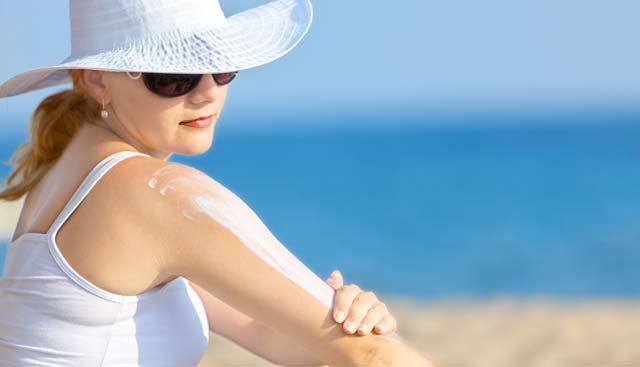
Summer Sun Safety Month – Learn to Protect Yourself Year Round
School’s out, vacation season is in full swing and almost everyone wants to spend time outdoors. Soaking up some sun can be pleasant and relaxing, help your body absorb some essential vitamin D and even improve your mood. But, before you head to the beach, jump into a pool or fire up your backyard grill, it’s important to take some precautions to help ensure that you don’t get too much of a good thing.
Overexposure to the sun’s harmful ultraviolet (UV) rays can lead to skin cancer, including malignant melanoma, as well as painful sunburns, heat stroke, dehydration, skin wrinkles and other premature signs of aging. Because the risk of UV exposure from the sun is generally highest between the hours of 10 a.m. and 4 p.m., it is especially important to be careful when outdoors during those times.
To help you protect yourself and your family, the skin cancer experts at Moffitt Cancer Center offer the following tips:
- Sunscreen – Before going outside, always apply a waterproof, broad-spectrum sunscreen with a sun protection factor (SPF) of 15 to 30. Pay particular attention to easily missed areas of your body, such as your ears, the tops of your feet and the part in your hair. Also, remember that sunscreen wears off, so you’ll need to reapply it every two hours, as well as after you swim or sweat.
- Clothing – The best way to protect your skin from sun damage is to cover it with clothing, including a loose-fitting, long-sleeved shirt and long pants made of a tightly woven fabric. Of course, wearing this type of clothing will be impractical if you’re swimming, so be sure to keep a T-shirt or rash guard on hand to cover up with while you’re in the water.
- Hat – Protect your head, ears, face and neck with the shade of a wide-brimmed hat constructed of a tightly woven fabric like canvas (UV rays can penetrate a straw hat). If you wear a baseball cap, be doubly sure to protect your ears and neck with sunscreen.
- Sunglasses – Protect your eyes by wearing wraparound sunglasses that block both UVA and UVB rays (most sunglasses sold in the U.S. meet this requirement, regardless of their cost). Well-designed sunglasses can help shield your eyes from damaging UV rays, prevent cataracts and also protect the delicate skin around your eyes from the harmful effects of sun exposure.
- Shade – Seek shade underneath a shelter, umbrella or tree, especially during the mid-day hours. Even if you are in a shaded area, though, you should still protect yourself with sunscreen, clothing, a hat and sunglasses.
- Water – Be sure to stay well-hydrated by drinking plenty of water throughout the day. While this is always important, it is critical when you are spending time in the sun.
Whether or not you’ve been in the sun, if you notice any unusual changes in your skin, such as a lesion that itches, bleeds or scabs, it’s important to have it checked out, no matter how subtle it seems to be. At Moffitt Cancer Center, we can evaluate your skin changes, confirm or rule out a skin cancer diagnosis and recommend appropriate treatment, if necessary. You can request an appointment with a skin cancer specialist by calling 1-888-663-3488 or completing a new patient registration form online. We do not require referrals.
